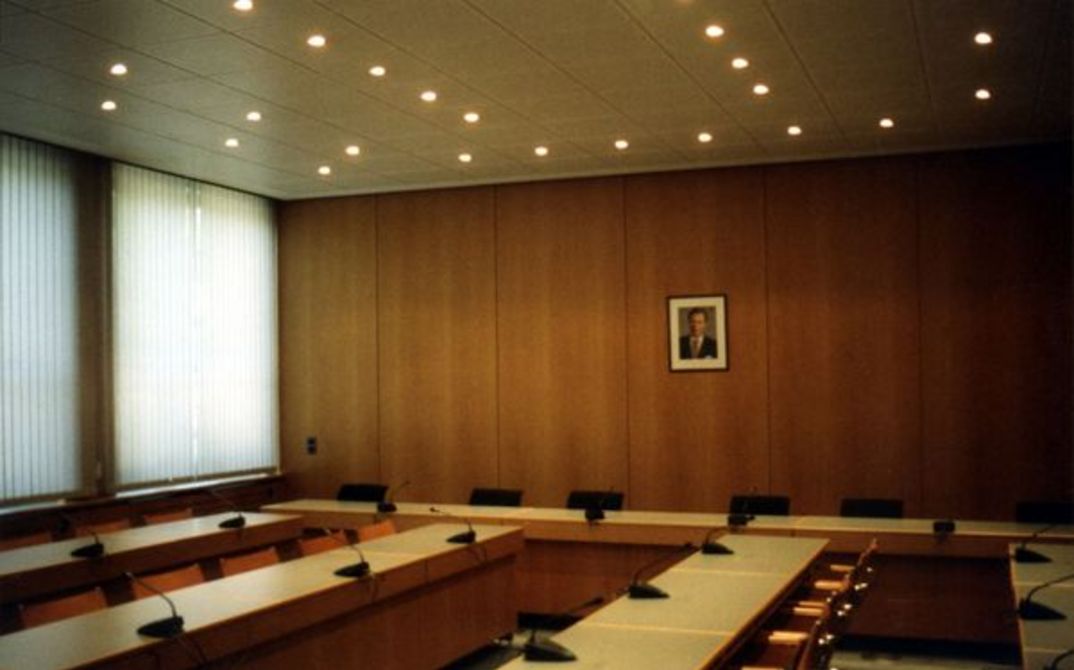“I feel both fascination and disgust in the face of the story of high capitalism”, wrote Gerhard Friedl in 2005 in an exposé to a film not able to be made. “At the same time, I have a desire to understand this era and form an impression of it. I don’t trust the impression I already have.” These three lines are placed at the beginning of the book recently published by Volker Pantenburg entitled “Gerhard Friedl. Ein Arbeitsbuch” (FilmmuseumSynemaPublikationen 34); they encapsulate the central aspects of his slim oeuvre: a rigorous view of the history and present of society structures is linked to the demand to use film operatively to fight against the system’s impositions and thoughtlessnesses. Friedl, born in the Steiermark in 1967, shot six films and video works between 1992 and 2009, the year of his death, two of them together with Laura Horelli. Now all of his films can be seen together in Berlin for the first time.
HAT WOLFF VON AMERONGEN KONKURSDELIKTE BEGANGEN? (Germany/Austria 2004, 5.12., with guest Ivette Löcker). Friedl’s graduation film at HFF München is an account of the intermingling between economy and politics in Germany and Europe of the 20th century. The protagonists, including the titular hero, were found by Friedl in recent economic history. “There can be no doubt that the staff are made up of stars: such as Friedrich Karl Flick, Otto Wolff Amerongen, Hans Friderichs, Graf Lambsdorff, von Brauchitsch“ (Friedl). Slow, patient pans over urban and industrial areas, tracking shots deep into (historical) spaces, accompanied by a soberly delivered run-through of the history of the traditions and crimes of big industry in the Federal Republic. The only feature-length work by the Austrian documentarian, a coproduction with WDR, is at the same time an opportunity to remember editor and facilitator Werner Dütsch (1939–2018), who was in close contact with Friedl and supported and appreciated his work. The first anniversary of Dütsch’s death is December 5th, 2019.
MDW (Germany 1992), AVID (Germany 1994), and KNITTELFELD – STADT OHNE GESCHICHTE (Austria/Germany 1997, 7.12., with guest Philip Widmann) was also created as part of his studies. As a series of short narrative vignettes, MDW – short for “Männer der Wissenschaft” (Men of Science) – already worked with the disassociation of sound and image, which is characteristic of Friedl’s later films. AVID shows the gold-medal-winner in skeet shooting at the Olympic Game in Munich in 1972 at three different points in history. A montage exercise, materials to analyze shooting. With KNITTELFELD – STADT OHNE GESCHICHTE, which received it premiere at the Duisburger Filmwoche in 1997, Friedl became known beyond the film school for the first time. The story of the Pritz family can be heard in voiceover, a narrative of escalation that tells of ever more grotesque crimes. The images are of inconspicuous places in the small Austrian town. “KNITTELFELD – STADT OHNE GESCHICHTE is one of the best films I know. An essay about the connection between landscape and crime that manage to be at once vivid and rich in discourse. In Munich, where we studied for a while together, the film was as if from another planet, it left a huge impression on me” (Christoph Hochhäusler)
THE “FRONTIER” OWNERS (USA/Germany 2008) and SHEDDING DETAILS (USA/Germany 2009, 7.12., with guest Laura Horelli) are the result of a collaboration with Laura Horelli. In conversations with trade unionists and based on the concrete example of fired cleaner Slavica Tricolic, materials are put together to examine working conditions in Las Vegas. “Our focus is on the work carried out in hotel and casinos. Las Vegas has 150,000 hotel rooms. Who carries out the work necessary there? What can be gleaned from the use of the space by those men and women working invisibly and in the background such that the hotels look brand new every single day?” (Horelli/Friedl) (vp)



